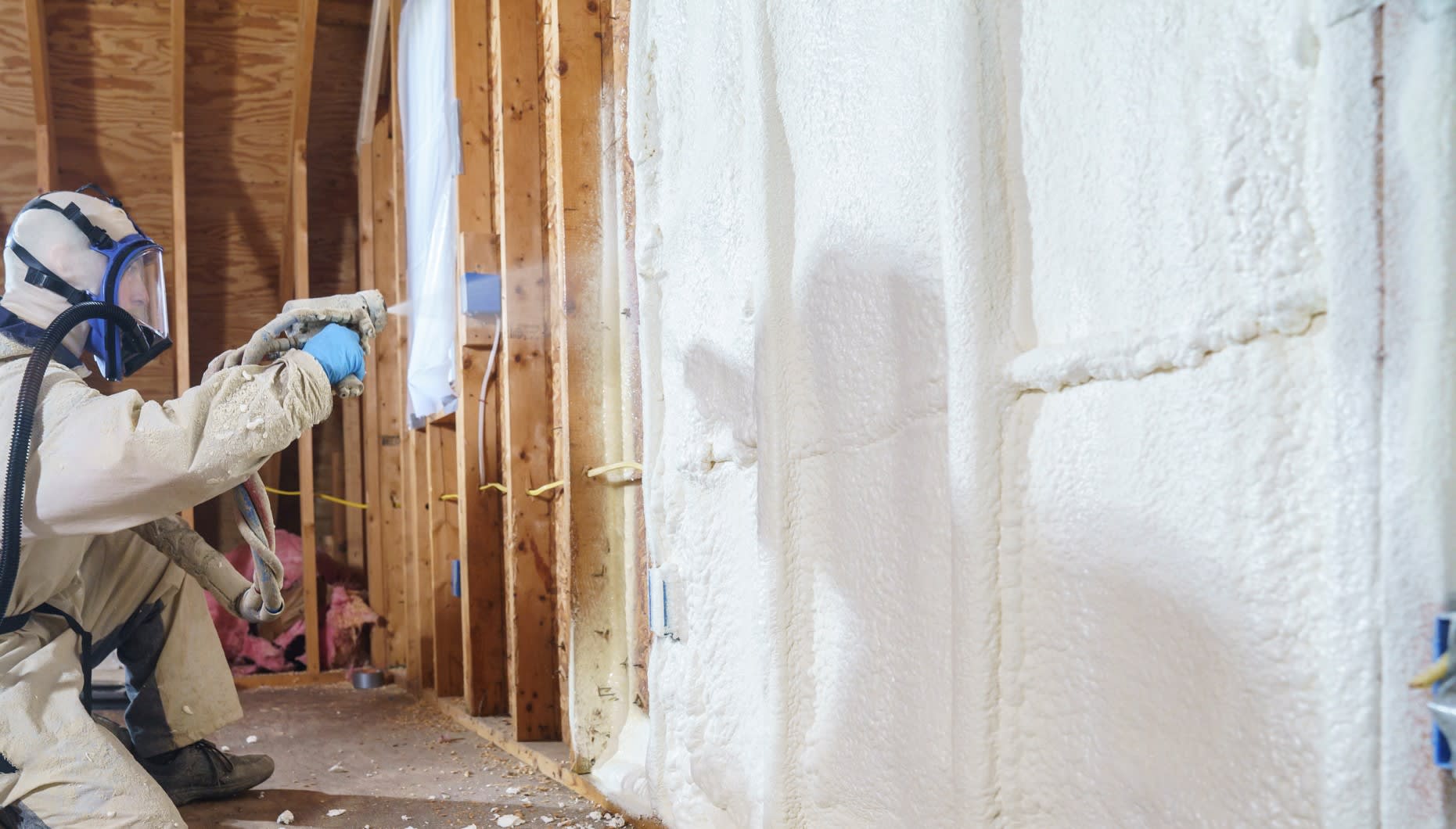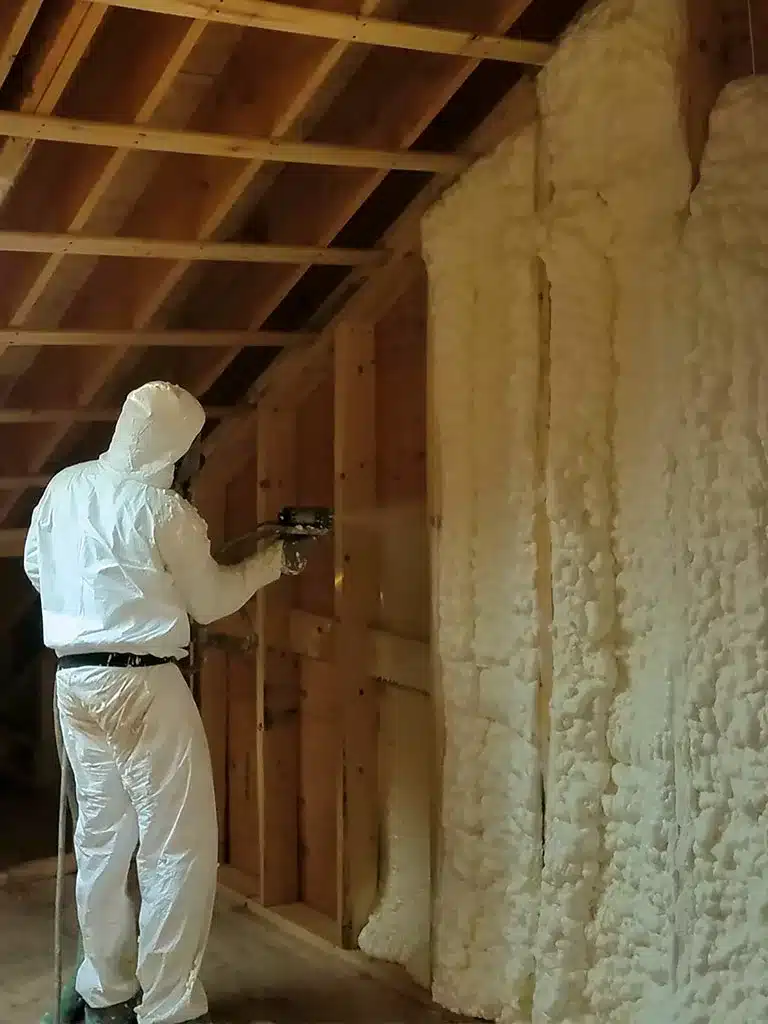The Process of Applying Spray Foam: What You Required to Know
The Process of Applying Spray Foam: What You Required to Know
Blog Article
Spray Foam: The Ultimate Service for Air Sealing and Insulation
Spray foam insulation has arised as a leading option for reliable air securing and thermal insulation, supplying a special mix of homes that set it besides typical approaches. Its capability to increase and fill up voids makes it specifically efficient in protecting against air leak, which can substantially impact power efficiency. Nevertheless, comprehending the complete extent of its advantages, installation procedures, and contrasts with various other insulation kinds is essential for making educated decisions. As we discover these aspects, the ramifications for both new constructions and retrofits end up being progressively substantial. What variables should influence your selection?
What Is Spray Foam?
Spray foam is a versatile insulation product that incorporates the concepts of air securing and thermal resistance to enhance power performance in structures. Made up primarily of polyurethane or various other comparable substances, spray foam is applied as a fluid that increases upon call with surfaces, creating a strong, continuous layer of insulation. This distinct property allows it to fill voids, splits, and spaces that standard insulation materials might forget, giving a premium air seal.
There are 2 major sorts of spray foam: open-cell and closed-cell. Open-cell spray foam is lighter and a lot more adaptable, using exceptional noise absorption and a reduced R-value per inch - Spray Foam. On the other hand, closed-cell spray foam is denser, offering a higher R-value, dampness resistance, and included structural honesty to building parts
The application process typically involves specialized equipment, guaranteeing a seamless application that abides by various substratums, consisting of timber, concrete, and metal. This adaptability makes spray foam suitable for both brand-new building and constructions and retrofitting existing structures. Its capability to produce an impermeable barrier significantly adds to lowering energy intake and boosting indoor air quality, thus making it a recommended choice amongst contractors and property owners alike.
Advantages of Spray Foam Insulation
Among the most significant advantages of spray foam insulation is its phenomenal capacity to develop a constant air obstacle, which properly minimizes power loss. Unlike conventional insulation products, spray foam expands to fill up spaces and splits, making certain that air leakage is dramatically decreased. This characteristic not just boosts power efficiency but also results in reduce utility bills in time.
In addition, spray foam insulation offers exceptional thermal resistance, contributing to an extra stable indoor setting. Its high R-value per inch permits effective insulation in restricted areas, making it suitable for attic rooms, walls, and crawl rooms. The moisture-resistant properties of spray foam help prevent mold and mold development, promoting much healthier living conditions.
One more crucial advantage of spray foam insulation is its sound-dampening qualities (Spray Foam). It properly minimizes noise transmission between rooms, creating a quieter and extra comfy home environment. The durability of spray foam likewise stands out, as it does not droop or resolve over time, keeping its performance throughout its life expectancy
How Spray Foam Works
Recognizing how spray foam insulation works is vital for valuing its performance in air securing and thermal resistance. Spray foam insulation contains 2 main parts: isocyanate and polyol material. When these parts are combined, they go through a chemical reaction that creates the material to expand swiftly, developing a thick foam that loads dental caries, spaces, and fractures.
As the foam broadens, it follows surface areas, forming an airtight seal that significantly minimizes air infiltration. This particular makes spray foam insulation very reliable at preventing drafts and wetness infiltration, which can lead to power loss and damage with time. Furthermore, the closed-cell version of spray foam provides premium thermal resistance check my site due to its stiff framework, efficiently lessening warmth transfer.
The unique properties of spray foam permit it to adjust to irregular surfaces, ensuring comprehensive coverage and a smooth barrier. Therefore, spray foam insulation not only boosts energy effectiveness but likewise adds to boosted indoor air quality by minimizing the build-up of allergens and contaminants. Eventually, understanding the mechanics behind spray foam emphasizes its role as a remarkable option for insulation and air securing in both household and commercial applications.
Installation Refine Introduction

Before installment, the space must be effectively cleansed and prepped, ensuring that surfaces are cost-free from particles, dampness, and dust. This action is crucial because pollutants can compromise attachment and general performance. Once the location is prepared, the application involves blending the two parts of the spray foam, which broadens upon contact and fills gaps effectively.
Trained specialists should perform the setup, utilizing specialized devices to make certain consistent protection and optimal density. Security preventative measures, including wearing protective equipment and ensuring correct air flow, are vital throughout this procedure. After application, the foam commonly remedies rapidly, forming a solid obstacle that improves energy effectiveness.
Contrasting Spray Foam to Conventional Insulation
When examining insulation options, spray foam insulation stands out in contrast to typical products such as fiberglass and cellulose. Unlike fiberglass and cellulose, which can enable air seepage, spray foam broadens upon application, loading gaps and gaps to produce a closed seal.
In addition, spray foam supplies a greater R-value per inch than conventional insulation types, offering more effective thermal resistance in a thinner account. This particular is particularly useful precede with restricted cavity deepness. Spray foam is resistant to dampness and mold and mildew development, which can be a substantial my latest blog post issue with cellulose and fiberglass, especially in damp environments.
However, spray foam insulation commonly brings a greater ahead of time expense than its standard counterparts. find out this here House owners need to weigh this initial financial investment versus long-term energy cost savings and efficiency advantages. Ultimately, while both insulation kinds serve their function, spray foam becomes an advanced service for contemporary insulation needs, particularly in regards to air sealing and thermal performance.

Verdict
In summary, spray foam insulation stands for a highly effective service for accomplishing ideal air securing and thermal resistance. Its one-of-a-kind residential or commercial properties, consisting of wetness resistance and audio dampening, make it appropriate for numerous applications in both new buildings and retrofitting jobs (Spray Foam). Although the preliminary expenses may be higher contrasted to typical insulation materials, the lasting advantages, such as significant energy financial savings and boosted indoor air high quality, validate the financial investment and highlight its value in modern structure practices.
Spray foam insulation has arised as a leading remedy for reliable air securing and thermal insulation, supplying a distinct mix of residential or commercial properties that establish it apart from traditional approaches.Spray foam is a flexible insulation material that incorporates the principles of air sealing and thermal resistance to improve energy efficiency in buildings.When assessing insulation alternatives, spray foam insulation stands out in contrast to typical materials such as fiberglass and cellulose. Inevitably, while both insulation kinds offer their function, spray foam emerges as an extra innovative service for modern insulation demands, especially in terms of air sealing and thermal performance.
In summary, spray foam insulation represents a highly reliable solution for accomplishing ideal air sealing and thermal resistance.
Report this page